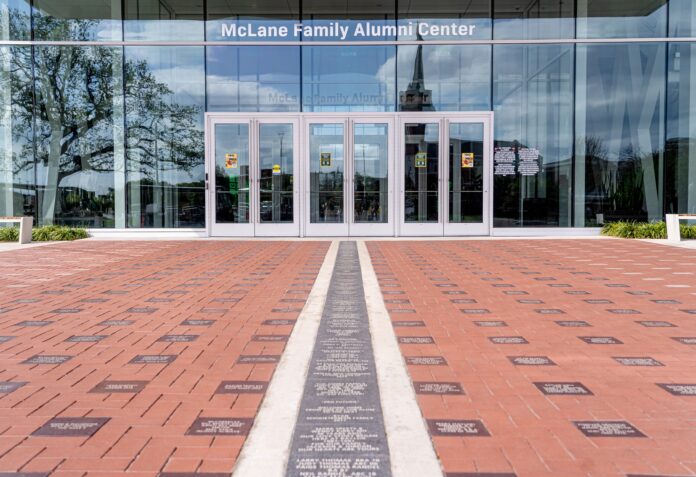
By Rory Dulock | Staff Writer
The 2024 Baylor Giving Day raised more than $2.24 million from the Baylor Family on Tuesday to fund academic initiatives and student scholarships.
Toby Barnett, associate vice president and campaign director for the Office of Advancement, said the Office of Advancement works with alumni both to engage with them in meaningful activities throughout the country and to solicit philanthropic support for the university.
Anyone can be a donor for Baylor. Barnett said the office routinely works with alumni and parents, but if somebody loves Baylor and wants to support its students, anyone can contact the office and make a gift.
“We would love to make it very easy [for donors to contribute], so you can go online, and there you can make gifts electronically,” Barnett said. “You can give to an existing scholarship fund. … One of the things that we do is we have a student calling group that makes outbound calls to alumni and parents and solicits gifts over the phone.”
Barnett said there are different types of scholarships based on need and merit.
“How scholarship gifts might look is [that] you have need-based scholarships and then you also have merit-based scholarships,” Barnett said. “So like the general university scholarship fund would be awarded by student financial aid and may go to a student with either high need or high merit. They would be responsible for distributing that aid to deserving students on our campus.”
Barnett said donors have the opportunity to donate any amount of funds or to create permanent endowed scholarships. They are also able to restrict scholarships by placing certain requirements on recipients.
“One of the ways that our donors really help to strengthen our institution is by giving to endowed scholarship funds,” Barnett said. “And so at our university, one of our ongoing and really important pieces of work is to grow our endowment to ensure that the university has permanent resources to be able to support students or research or faculty in a meaningful way.”
Barnett said many donors want to give back to the university because they want to show their gratitude and invest in students.
“I’ve really enjoyed working with donors who set up scholarships,” Barnett said. “Many times, it really is a position of gratitude — a student that’s had a life transformative education, and they just want to make sure to kind of pay it forward and for other people to enjoy that same type of experience. If you’re looking for a good investment, what better way to spend your charitable dollars than supporting somebody that believes in Baylor?”
Dr. Mia Moody-Ramirez, chair of journalism, public relations and new media, said the department is fortunate to have alumni and benefactors who want to help students afford their education.
“[The department has] more than 40 donors who have donated scholarships over the years, and I have talked to one of our major donors,” Moody-Ramirez said. “She told me that a group of alums got together in the ’60s and ’70s, and they began to donate money to the university to fund scholarships for graduates or for students who are majoring in journalism.”
Moody-Ramirez said she endowed a scholarship with the help of other donors to give back to the university. The scholarship is the Moody-Ramirez Belden Endowed Scholarship for Diversity, and it is given to students who are members of the National Association of Black Journalists.
“The scholarship was funded two years ago, and I was blessed to be able to donate $20,000 to the scholarship after receiving the Cornelia Marschall [Smith] Professor of the Year Award, which comes with a $20,000 award,” Moody-Ramirez said. “I wanted to be able to give it back to Baylor University.”
It was because of the donors who supported her education at Baylor that Moody-Ramirez was inspired to give back to other students, she said.
“I actually have two degrees from Baylor, and after I graduated, I did not have a loan. I didn’t have to pay anything back, and that was because I received scholarships,” Moody-Ramirez said. “Each time you receive a scholarship, you write a thank you note to the donors or to the individuals who fund those scholarships, and I can remember writing in those notes that I can’t wait until I have my job one day so that I can maybe fund a scholarship. It just so happened that that actually happened. So to me, that’s a blessing to be able to do that, to actually be able to help students with their education.”
Barnett said even small contributions to student scholarships make a huge impact, and he encourages everyone to consider supporting students through scholarship funds.
“Every gift really makes a difference,” Barnett said. “It’s really important to know that that’s a meaningful gift, and we really appreciate their consideration. I think that as a donor to scholarships, you get the privilege of being kind of that voice of saying, ‘Hey, you can do it. You’re welcome at Baylor. We have confidence in you.’ And so it’s humbling to be a part of kind of that dynamic enterprise.”





